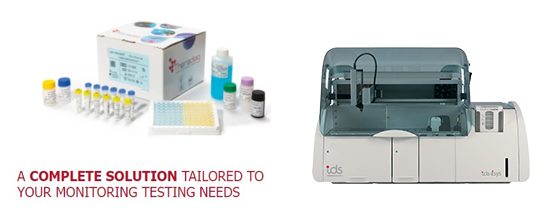Abacus dx Publication of the month
Products are for professional/laboratory use only.
Swapping versus dose optimization in patients losing response to adalimumab with adequate drug levels. Roblin X, Genin C, Nancey S, Williet N, Veyrard P, Boschetti G, Phelip JM, Berger AE, Killian M, Waeckel L, Flourie B and Paul S. Inflammatory Bowel Diseases, 2021, Aug 18:izab158.
Abstract
Background: In cases of loss of response due to mechanistic failure under antitumor necrosis factor agents, it is recommended to switch to another class of biologics. Two different strategies were compared in patients with inflammatory bowel disease (IBD) who were treated with nonoptimized adalimumab (ADA) and experienced a loss of response despite therapeutic trough levels of adalimuma-either ADA dose optimization or switching to vedolizumab or ustekinumab.
Methods: Patients under maintenance therapy with ADA monotherapy (40 mg every 14 days) and who experienced a secondary loss of response with trough levels > 4.9 μg/mL were included prospectively in this nonrandomized study. The primary end point was the survival rate without therapeutic discontinuation after ADA dose optimization or switching to another class of biologics.
Results: Adalimumab was optimized (n = 61 patients, 42 Crohn’s disease, 19 ulcerative colitis) or swapped for vedolizumab (n = 40, 20 ulcerative colitis) or ustekinumab (n = 30, 30 Crohn’s disease). At 24 months, 11 out of 70 patients (14.8%) in the swap group discontinued treatment compared with 36 out of 61 (59.6%) patients in the optimization group (P < 0.001). The median time without therapeutic discontinuation was significantly longer in the swap group (>24 months) than in the optimization group (13.3 months, P < 0.001). In the optimization group, treatment discontinuation was positively associated with baseline fecal calprotectin >500 μg/g (HR, 3.53; 95% CI, 1.16-10.72; P = 0.026) and inversely associated with variation of trough levels of adalimumab (>2 µg/mL from baseline to week 8 after optimization; HR, 0.51; 95% CI, 0.13-0.82; P = 0.03). In the swap group, no factor was associated with treatment discontinuation.
Conclusion: In IBD patients under ADA maintenance therapy who experience a secondary loss of response and in whom trough levels are >4.9µg/mL, swapping to another class is better than optimizing ADA, which is, however, appropriate in a subgroup of patients.






